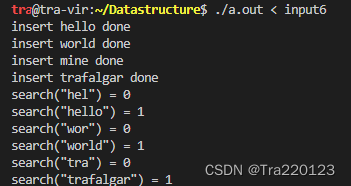用于单词查找,字符串排序。
code:
#include <stdio.h>
#include <stdlib.h>
#include <string.h>
#define BASE 26
#define MAX_N 10000
char s[MAX_N + 5];
typedef struct Node
{
int flag;
struct Node *next[BASE];
} Node;
Node *getNewNode() {
Node *p = (Node *)malloc(sizeof(Node));
p->flag = 0;
memset(p->next, 0, sizeof(Node *) * BASE);
return p;
}
inline int code(char c){
return c - 'a';
}
void insert(Node *root, const char *s) {
Node *p = root;
for (int i = 0; s[i]; i++)
{
int ind = code(s[i]);
if (p->next[ind] == NULL) p->next[ind] = getNewNode();
p = p->next[ind];
}
p->flag = 1;
return;
}
int search(Node *root, const char *s) {
Node *p = root;
for (int i = 0; s[i]; i++)
{
int ind = code(s[i]);
p = p->next[ind];
if (p == NULL) return 0;
}
return p->flag;
}
void clear(Node *root) {
if (root == NULL) return;
for (int i = 0; i < BASE; i++) clear(root->next[i]);
free(root);
return;
}
int main(int argc, char const *argv[])
{
Node *root = getNewNode();
//insert
while (~scanf("%s", s))
{
if (strcmp(s, "__end__") == 0) break;
insert(root, s);
printf("insert %s done\n", s);
}
//search
while (~scanf("%s", s))
{
if (strcmp(s, "__end__") == 0) break;
printf("search(\"%s\") = %d\n", s, search(root, s));
}
clear(root);
return 0;
}

查找单词并排序
#include <stdio.h>
#include <stdlib.h>
#include <string.h>
#define BASE 26
#define MAX_N 10000
char s[MAX_N + 5];
typedef struct Node
{
int flag;
struct Node *next[BASE];
} Node;
Node *getNewNode() {
Node *p = (Node *)malloc(sizeof(Node));
p->flag = 0;
memset(p->next, 0, sizeof(Node *) * BASE);
return p;
}
inline int code(char c){
return c - 'a';
}
void insert(Node *root, const char *s) {
Node *p = root;
for (int i = 0; s[i]; i++)
{
int ind = code(s[i]);
if (p->next[ind] == NULL) p->next[ind] = getNewNode();
p = p->next[ind];
}
p->flag = 1;
return;
}
int search(Node *root, const char *s) {
Node *p = root;
for (int i = 0; s[i]; i++)
{
int ind = code(s[i]);
p = p->next[ind];
if (p == NULL) return 0;
}
return p->flag;
}
void __string_sort(Node *root, int k, char *s) {
s[k] = '\0';
if (root->flag) {
printf("find string: %s\n", s);
}
for (int i = 0; i < BASE; i++)
{
if (root->next[i] == NULL) continue;
s[k] = 'a' + i;
__string_sort(root->next[i], k+1, s);
}
return;
}
void string_sort_print(Node *root) {
__string_sort(root, 0, s);
return;
}
void clear(Node *root) {
if (root == NULL) return;
for (int i = 0; i < BASE; i++) clear(root->next[i]);
free(root);
return;
}
int main(int argc, char const *argv[])
{
Node *root = getNewNode();
//insert
while (~scanf("%s", s))
{
if (strcmp(s, "__end__") == 0) break;
insert(root, s);
printf("insert %s done\n", s);
}
//search
while (~scanf("%s", s))
{
if (strcmp(s, "__end__") == 0) break;
printf("search(\"%s\") = %d\n", s, search(root, s));
}
string_sort_print(root);
clear(root);
return 0;
}
